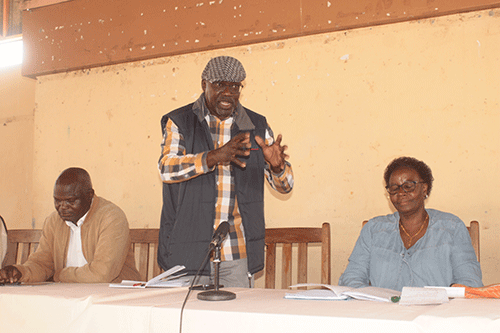RUNDU – Kavango East residents are pushing for the amendment of laws and policies governing wildlife, with human life and protection at the centre of this revolution.
According to the inhabitants, the status quo protects wildlife, more than human life. They are now demanding that policies of establishing national parks be revisited, “so that the park can be taken far from where we live and that the challenges we are facing can at least be minimal.”
They live within the proximity of the Bwabwata National Park.
These calls were registered during recent public hearings between Mukwe constituency communities on a motion on the human-wildlife conflict and the Parliamentary Standing Committee on Natural Resources.
In no uncertain terms, the community members expressed disappointment in the authorities’ handling of human-wildlife conflict-related issues.
“If you can send officials to go look for mahangu or any harvest produce at our homesteads, they won’t find anything because elephants have finished it. Elephants are everywhere and we live in fear,” Kapinga Mangundu from Kangundja village told the MPs.
“We try to engage the authorities but they never come to see our plight. We report but they never come. The ministry must deal with problem animals but they never do. They allow them to roam among us. We once had a blind elephant in our village for three weeks, we reported it but no one came to take it out until it disappeared, imagine if it could have killed someone,” Mangundu continued to voice their fear.
Agreeing with Mangundu was another villager, Bony Mushongo, who said villagers also lose out on their fresh produce planted in gardens along the river, as hippos feed on them.
What is painful, Mushongo said, is they do not get compensated by the environment ministry for losses incurred.
“They [ministry] ask you, why do you grow cabbages so close to the river, don’t you know it’s the hippo’s habitat? So maybe this should also be looked into as these are some excuses they are using,” he said.
Meinold Kupinga, who’s sister died in the jaws of a crocodile, told the committee that the payments from the ministry should be expeditious, to cater for the deceased’s funeral costs by their loved ones.
“Funerals these days are expensive and, in some families, no one earns an income, but we also feel that we should give our loved ones a decent funeral but then the claim takes long. The ministry should speed up the offset payment, it is not our wish to lose them,” he said.
The committee is chaired by former Cabinet minister Tjekero Tweya.
The outspoken Tweya, during the engagement said their mission was to scrutinise the motion on human-wildlife conflict, with the help of the affected people.
This will ultimately result into recommendations that will result into lasting solutions, he said.
“And the main complaint is that when you have a problem, whether it is an elephant destroying crops or a crocodile or buffalos or lions, the officials respond very slow or they don’t respond at all.
“But if they get information that an animal is about to be killed, the way they put it is that in five seconds, you will see 10 cars with the police and the whole brigade is there to effect an arrest. This is what the communities in these particular regions experience and the reason people say that government through its laws, favours animals more that when the human lives are in danger,’’ he said recently.
“Officials don’t take them seriously but when the animal is in danger, suddenly there are vehicles and fuel is available and even the police are available to effect an arrest. These are the general issues that were raised by the communities,” Tweya said.
Tweya was not done.
“The compensation is very pathetic, the sarcastic behaviour of the officials for example if you have lost livestock, they want proof like if a crocodile has caught a person, you must have proof but the officials are not helping them exactly how to go about it. The crocodile attacks a person or animal to eat, where will they get the proof?” Tweya wanted to know.
According to the Mukwe community, if the government wants them to coexist with the wildlife, their safety too, must be guaranteed.
“It may have been reviewed in 2018, but it was only reviewed at the national level without consultation of the people. Others don’t even have a clue what policy the ministry is talking about,’’ Tweya noted.
“Those are genuine issues, from here, once the consultations from all regions and affected communities have been completed, we will then also have the ministry respond to some of the findings before the final report is tabled back to Parliament for debate and then enrich the report before a final decision is taken,’’ he said.
Tweya said it is regrettable to note that the ministry, after 33 years of independence did not see the need to bring a new law to manage the country’s natural resources within the spirit of an independent Namibia.
Instead, he said, the environment and tourism sector has been run through policies that are not consulted with the people whose lives and livelihoods, are hardest hit or at great risk.
– jmuyamba@nepc.com.na


